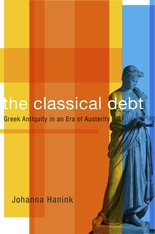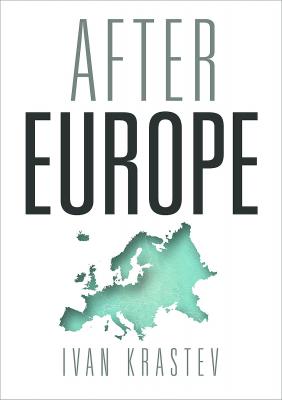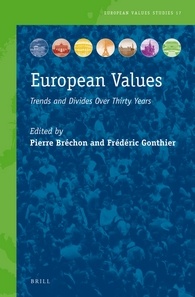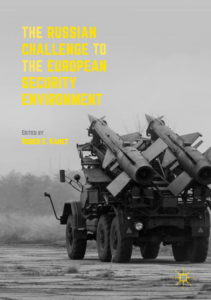
 The Classical Debt: Greek Antiquity in an Era of Austerity
The Classical Debt: Greek Antiquity in an Era of Austerity
By Johanna Hanink
Publisher: Belknap Press
Recommended by Louie Dean Valencia-García
An immensely well-written and provocative book, Johanna Hanink’s The Classical Debt: Greek Antiquity in an Era of Austerity tightly weaves together the threads of past and present like an ancient Greek warp-weighted loom. In her work, Hanink asks why is contemporary Greece so readily seen today through the lens of its ancient past, pointing to numerous examples of newspaper cartoons that juxtapose the country’s current debt crisis with the crumbling ruins. Simultaneously, the author asks why does Europe, and the broader West, look to Greece as part of its foundational myth—a supposed well-spring from whence came European identity and democracy (despite Athens historically being more oriented eastward and having institutionalized slavery). Hanink traces the ways the West sees Europeanness and democracy as part of the imagined “debt” that western civilization believes it owes Greece. To do this, The Classical Debt first looks at ancient Greece’s “branding” of itself, the disappointment travelers to Greece found when they visited the storied place in the early modern period—expecting something quite different—, and the eighteenth-century “seismic shift that caused Greece’s gaze to shift from east to west.” Hanink then delves into the ensuing decades in which “modern Greece” emerged as an independent nation and philhellenism came into fashion. After well situating her reader in the imagining of Greece, she jumps head first into the twenty-first-century imagining of the European continent’s perceived cultural indebtedness to Greece (and the financial debt Greece owes Europe). How can Europe exist without Greece? And how can Greece survive Europe? A classicist by training, Hanink’s second monograph has wide appeal for any scholar of Europe.
 After Europe
After Europe
By Ivan Krastev
Publisher: University of Pennsylvania Press
Recommended by Malcolm Campbell-Verduyn
The future of the EU- and without the EU- has always been worth contemplating, yet perhaps never more so than now. Facing an ever-growing number of largely interconnected and seemingly intractable problems, the EU is an organization whose current forms of supranational organisation- and sheer existence- may be in jeopardy. Elucidating these challenges and exploring possibilities arising from failures to successfully address them, Krastev provides a timely and provocative account that is of relevance to all Europeans and Europeanists.
 European Values: Trends and Divides Over Thirty Years
European Values: Trends and Divides Over Thirty Years
Edited by Pierre Bréchon and Frédéric Gonthier
Publisher: Brill
Recommended by Hélène B. Ducros
In the face of Brexit and in the aftermath of French presidential elections in which Europe was central to the campaign, this book is timely. The context of swelling populist rhetoric that intimates looming erasure of national specificities imposed from top-down dynamics stirs all Europeans into introspection with regard to their shared identity and common goals. Based on the longitudinal European Values Study initiated in the late 70s to identify over time the attitudes of the peoples of Europe (going beyond the EU to include 47 countries) towards a number of societal themes, the contributors to the edited volume (French sociologists and political scientists) explain how and why European citizens’ perspectives on a range of topics have evolved in the period between 1981 and 2008. Why is there either convergence or increased divergence across Europeans in the way they envisage family, the role of the State, culture, education, social relations, immigration and xenophobia, the environment, religion and secularization, or European integration?
Although the book concludes that some key values have been held rather stable, the geography of European values highlights a divide in the way people hierarchize what matters to them, with an affirmed difference between Western Europe and countries of the East and South, for example when it comes to individual vs collective values or their attachment to the EU. Additional considerations of gender, class, and age complete the dataset analysis to convey a mixed picture of European values that also diverge across social groups within each region or nation as identities are plural and multilayered. As the EU reassesses the European project, this study also poses the question of how to generate meaningful information when comparing countries of different sizes, different political cultures, and different economic conditions. One can also wonder how these values will further evolve –and may have already changed since 2008– as baby-boomers get older and the Millennial generation comes to age. This thought-provoking book is a further reminder that the European Union generates a wealth of quantitative survey data from which social scientists can draw to better understand and guide Europe as a community of peoples.
 The Russian Challenge to the European Security Environment
The Russian Challenge to the European Security Environment
Edited by Roger E Kanet
Publisher: Springer
Recommended by Daniela Irrera
In these hard times for global security, in which the EU is slowly trying to re-define its strategy and strengthen its alliances, it is particularly important to reflect more on the role of Russia and on its influence in the region. This edited book offers a detailed and complete overview of such crucial topic, by deepening three relevant factors: firstly, the transformations and stable trends in the approach Putin’s Russia is demonstrating towards the West; secondly, the reasons why the conflict in Ukraine represents more than a local challenge; thirdly, the persistent importance of stability in the relations with the EU. Despite its lack of communication and the doubts about its performance in the global system, Russia remains a necessary political player.
 European Citizenship after Brexit: Freedom of Movement and Rights of Residence
European Citizenship after Brexit: Freedom of Movement and Rights of Residence
By Patricia Mindus
Publisher: Palgrave Macmillan
Recommended by Özden Ocak
A major consequence of Brexit is an automatic and collective loss of citizenship for EU citizens of exclusively British nationality. This loss of citizenship and connected reduction of rights will affect not only the situation of the British nationals in other parts of the European Union but also the future of the second country nationals and their families in the UK. However, the political volatility and the legal uncertainty surrounding the matter, the novelty in what is happening, and the significance of Brexit for Union citizenship precludes clear-cut answers to the questions “which rights can be frozen” and “who gets to withdraw the status”. To investigate the legal uncertainties Brexit would create for EU citizenship, Patricia Mindus draws on the functionalist approach to citizenship that primarily describes the relationship between entitlements and access criteria. Utilizing such a perspective sheds light on the very nature of EU citizenship and the vertical relation between the Union and its citizens. More specifically it helps develop a line of analysis that inquires “if loss can be determined solely at domestic level, are entitlements still transnational rights and if entitlements are transnational individual rights, can loss be univocally determined by a Member State”? Employing such a theoretically informed analysis, Mindus concludes that while Member States are in principle free to repeal Union citizenship, former Member States (the UK in this case) are not unrestricted in revoking Union citizens of their acquired territorial rights.




